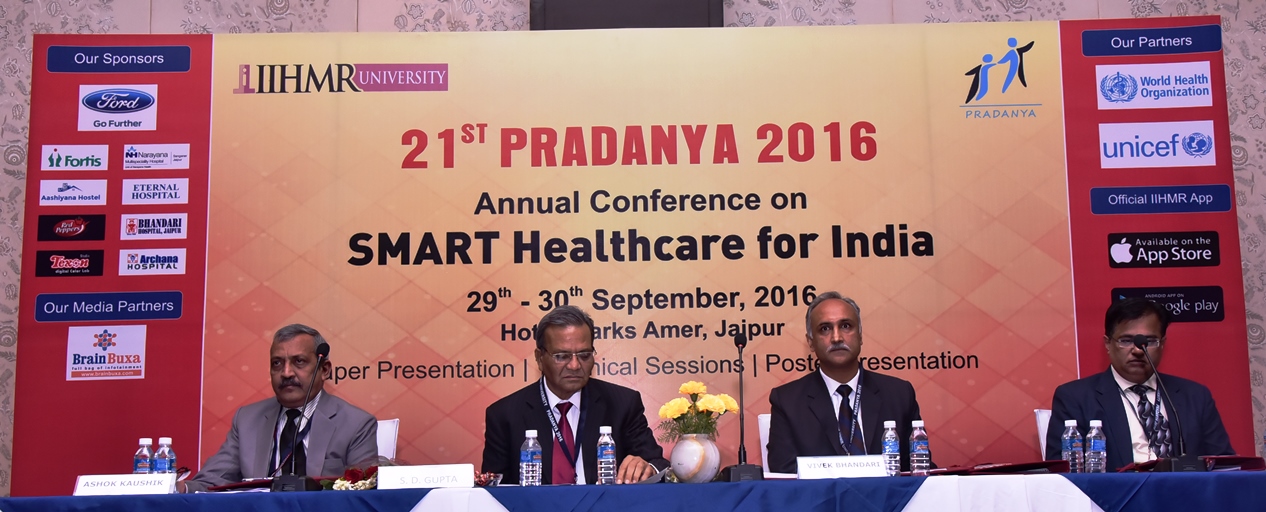India,01 October, 2016 : India’s globally recognised and leading healthcare research institutions, IIHMR University, today inaugurated its 21st Annual Conference – Pradanya 2016. This most awaited two days’ conference was inaugurated by the Chief Guest, Dr. SD Gupta, chairman, IIHMR University in presence of Dr.Vivek Bhandari, President of IIHMR University and other dignitaries.

The healthcare sector, in India and across the developing countries, is both complex as well provides immense opportunity. Despite new technological advancements and developmental progress, the accessibility and accountability to affordable basic health and wellness care remains an important challenge. This is imperative for attainment of goals of the health care sector.
In this context, the United Nation’s 2030 Sustainable Development Agenda is of unprecedented scope and ambition, applicable to all countries. This Agenda includes 17 Sustainable Development Goals (SDGs) and 169 targets comprising of a broad range of economic, social and environmental objectives. Health has a central place in SDGs: Ensure healthy lives and promoting wellbeing for all at all ages.
Taking into consideration the current challenges which the healthcare sector is confronted in context of the SDGs, this conference on “SMART Healthcare for India” will provide a platform for deliberation on these important issues.
Sustainable Healthcare, SDGs:
A sustainable healthcare is a widely discussed and crucial issue for developing countries. Sustainable healthcare ranges from primary healthcare to super specialty care, thereby engendering comprehensive health. India is seeing a significant improvement in public healthcare, but has to address a multitude of problems. Governments and other stakeholders should come together to develop a framework which is feasible and attainable within available resources.
Managing Healthcare:
Well managed health care setups have a profound effect on the quality of care. As competition intensifies, patient experience, service quality, and efficient resource management provides the evidentiary basis for measuring patient, clinician, and organizational outcomes. With emphasis on “quality outcomes,” it is becoming increasingly critical for health care organizations to develop and implement a sound management strategy for providing result oriented effective care. The future success of the organization will largely depend on judiciously managing the healthcare institutions while delivering consistently effective and efficient care.
Accessibility and Accountability in Healthcare:
Access to healthcare is fundamental in the performance of health care systems around the world. However, access to health care remains a complex notion as exemplified by the varying interpretations of the different agencies.
A conceptual framework and accountable, health care system is the need of the hour to meet the national and organizational level healthcare goals, with data for decision making being the key strategy.
Resources in Healthcare: Rising cost of healthcare is a challenge world over. Delivery of good quality affordable healthcare remains an enormous challenge to the health system. Although, there have been many improvements and innovations in the healthcare delivery system, the effective management of resources, lack of funding and dismal scenario of health insurance remains an unsolved issue. There is a need to harmonize the different stakeholders involved in this process to address these challenges.
Technological Advancements in Healthcare: The technology shift has cast itself over the field of healthcare, bringing with it a digital transformation in the way doctors and patients interact. Due to the increasing convergence of technology and healthcare, there is a huge opportunity for providers to improve the patient experience and operate more efficiently due to augmented association and information sharing among providers.
